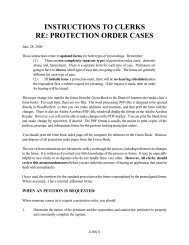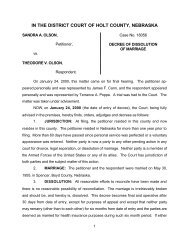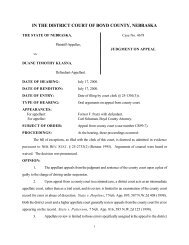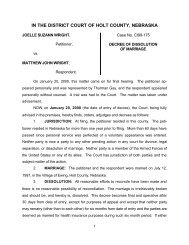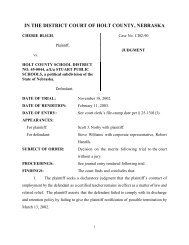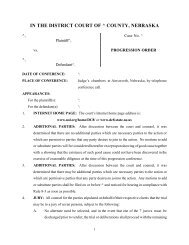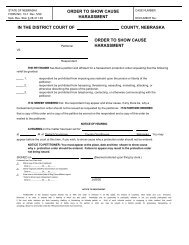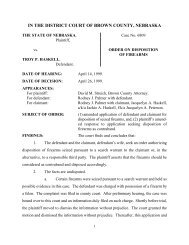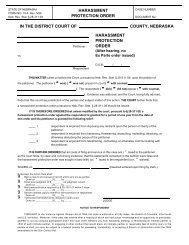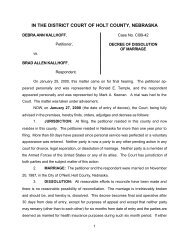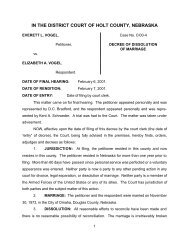IN THE DISTRICT COURT OF CUSTER COUNTY, NEBRASKA
IN THE DISTRICT COURT OF CUSTER COUNTY, NEBRASKA
IN THE DISTRICT COURT OF CUSTER COUNTY, NEBRASKA
Create successful ePaper yourself
Turn your PDF publications into a flip-book with our unique Google optimized e-Paper software.
<strong>IN</strong> <strong>THE</strong> <strong>DISTRICT</strong> <strong>COURT</strong> <strong>OF</strong> <strong>CUSTER</strong> <strong>COUNTY</strong>, <strong>NEBRASKA</strong><br />
LEE M. ALLEN, Personal Representative<br />
of the Estate of Gladys I. Christensen,<br />
vs.<br />
Plaintiff,<br />
GEORGE C. HAYNES, DAPHNE Y.<br />
HAYNES, TEDD C. HUSTON, BARBARA<br />
A. STAAB and <strong>CUSTER</strong> <strong>COUNTY</strong><br />
FOUNDATION, <strong>IN</strong>C.,<br />
Defendants.<br />
1<br />
Case No. CI98-76<br />
DECREE<br />
DATES <strong>OF</strong> TRIAL: August 28-31, September 1, 5-6, and November 27-28, 2000.<br />
DATE <strong>OF</strong> RENDITION: February 26, 2001.<br />
DATE <strong>OF</strong> ENTRY: Date of filing by court clerk per § 25-1301(3).<br />
APPEARANCES:<br />
For plaintiff: William C. Nelson and David P. Thompson, of Pierson, Fitchett,<br />
Hunzeker, Blake & Katt, with plaintiff.<br />
For defendants:<br />
Haynes & CCF: Edward D. Steenburg, of McQuillan, Steenburg & McQuillan,<br />
P.C., with defendants Haynes and Jo Ann Houser, corporate<br />
representative of defendant CCF.<br />
Huston: Tedd C. Huston, defendant, pro se.<br />
Staab: Claude E. Berreckman with defendant.<br />
SUBJECT <strong>OF</strong> DECREE: Decision on the merits following trial to the court in equity.<br />
PROCEED<strong>IN</strong>GS: See journal entries rendered on September 6, and November 28,<br />
2000.<br />
F<strong>IN</strong>D<strong>IN</strong>GS: The court finds and concludes that:<br />
1. Gladys I. Christensen (referred to either as the decedent or Gladys) originally commenced<br />
this action. After her death, the action was revived in the name of her personal representative, Lee M.<br />
Allen. The action focuses on the events following the death of the decedent’s husband, Paul L. Christensen<br />
(referred to either as P.L. or Chris), on September 4, 1995.
2. At the time of P.L. Christensen’s death, he and Gladys lived in Broken Bow. The<br />
defendants, George Haynes (George) and Daphne Haynes (Daphne), formed a strong friendship with Chris<br />
and Gladys many years ago. Although the Hayneses later moved from Custer County to Ogallala, they<br />
maintained their strong friendship with the Christensens. After engaging in ranching for a number of years,<br />
George worked in banking before his retirement some years before the events relating to this action. After<br />
Chris’s death, Gladys gave George a power of attorney and actively sought his help in managing her<br />
business affairs.<br />
3. The defendant, Tedd C. Huston (Huston), practiced law in Broken Bow for many years<br />
before the events relating to this case, first on a full-time basis and in the later years on a part-time basis.<br />
Huston provided legal services to the Christensens for many years, including regular preparation of the<br />
Christensens’ income tax returns. Prior to Chris’s death, Huston had prepared wills for Chris and Gladys.<br />
After Chris’s death, he represented Gladys in the probate of Chris’s estate and provided other legal<br />
services to Gladys.<br />
4. The defendant, Barbara A. Staab (Staab), provided caregiving services to the decedent.<br />
These services began on a part-time basis, but with the deterioration of Gladys’s health expanded to full-<br />
time.<br />
5. The plaintiff’s petition alleges four causes of action. The first cause of action seeks to set<br />
aside a deed of the Christensen ranch given by Gladys to the Hayneses on November 18, 1997, based<br />
upon claims of lack of donative capacity and undue influence. The second cause of action seeks the same<br />
relief based upon a claim of fraudulent misrepresentation. The third cause of actions seeks various relief<br />
concerning allegations of excessive compensation for George’s and/or Daphne’s services, excessive<br />
compensation to Staab, excessive compensation to Huston, and unauthorized gifts to the Hayneses, Huston,<br />
and Staab. The fourth cause of action seeks to recover possession of a 1996 Chevrolet S10 pickup, which<br />
the plaintiff claims that Gladys titled jointly with Daphne because of fraudulent misrepresentation.<br />
6. Shortly after the Hayneses recorded the deed from Gladys, they conveyed a one-half<br />
interest in the ranch to the Custer County Foundation, Inc. (the Foundation) without consideration. The<br />
plaintiff also seeks to set aside the deed from the Hayneses to the Foundation.<br />
2
7. The pretrial order expressly limits and modifies the legal and factual issues to: (a) first cause<br />
of action: (1) competence, and, (2) undue influence; (b) second cause of action: fraud in the inducement;<br />
(c) third cause of action: (1) accounting, (2) breach of fiduciary duty, (3) excessive compensation, and, (4)<br />
unauthorized gifts; and, (d) fourth cause of action: unauthorized gift. The pretrial order expressly provides<br />
that the issues stated in the pretrial order supersede all of the pleadings. No objection was filed to the<br />
pretrial order. The issues set forth in the pretrial order supplant those raised in the pleadings. Engelhaupt<br />
v. Village of Butte, 248 Neb. 827, 539 N.W.2d 430 (1995); Cockrell v. Garton, 244 Neb. 359,<br />
507 N.W.2d 38 (1993); Elwood v. Panhandle Concrete Co., 236 Neb. 751, 463 N.W.2d 622<br />
(1990). Thus, the court limits its analysis to the issues framed by the pretrial order.<br />
8. The first and second causes of action seek to set aside the deed to the Hayneses and the<br />
subsequent partial deed to the Foundation. Although incapacity, undue influence, and fraud in the<br />
inducement have different elements, many of the same items of evidence tend to relate to these issues.<br />
9. In order to make a valid gift, the donor must possess sufficient mental capacity to<br />
comprehend the transaction, to understand the extent and value of her property, to know what persons are<br />
the objects of her bounty, and the manner in which she is distributing her property among them.<br />
Parkening v. Haffke, 153 Neb. 678, 46 N.W.2d 117 (1951). Validity of a gift requires sufficient<br />
mental capacity. Id. In order to execute a valid deed, at the time of making the deed the grantor must have<br />
the capacity to understand what she is doing, know the nature and extent of her property and what she<br />
proposes to do with it, and to decide intelligently whether she desires to make the conveyance. Id. In<br />
order to set aside a deed for want of mental capacity on the part of the grantor, it must be clearly<br />
established that the grantor’s mind was so weak or unbalanced at the time of execution of the deed that<br />
she could not understand and comprehend the purport and effect of what she was doing. In re Estate<br />
of Saathoff, 206 Neb. 793, 295 N.W.2d 290 (1980); Anderson v. Claussen, 200 Neb. 74, 262<br />
N.W.2d 438 (1978); Westerdale v. Johnson, 191 Neb. 391, 215 N.W.2d 102 (1974). The party<br />
asserting the lack of mental capacity bears the burden of proving that issue by clear and convincing<br />
evidence. Miller v. Westwood, 238 Neb. 896, 472 N.W.2d 903 (1991).<br />
10. The party asserting undue influence bears the burden of proving, by clear and convincing<br />
evidence, that the grantor was subject to undue influence, there was an opportunity to exercise undue<br />
3
influence, there was a disposition to exercise undue influence for an improper purpose, and the result was<br />
clearly the effect of undue influence. Id.<br />
11. The mere existence of a confidential relationship does not void a conveyance. Golgert<br />
v. Smidt, 197 Neb. 667, 250 N.W.2d 628 (1977). Where the plaintiff establishes the existence of a<br />
confidential relationship, the burden of going forward with evidence to overcome a presumption of undue<br />
influence shifts to the defendant. Id. However, the burden of proof remains upon the contestant. Id. After<br />
evidence has been introduced, the presumption disappears. In re Estate of Novak, 235 Neb. 939, 458<br />
N.W.2d 221 (1990). The presumption may be rebutted by proof that the testator had competent<br />
independent advise, that the instrument was her own voluntary act, or by other evidence of the<br />
circumstances surrounding the execution of the instrument. Id.<br />
12. The elements of a cause of action for fraudulent misrepresentation are (1) that a<br />
representation was made; (2) that the representation was false; (3) that when made, the representation was<br />
known to be false or made recklessly without knowledge of its truth and as a positive assertion; (4) that<br />
it was made with the intention that the plaintiff should rely upon it; (5) that the plaintiff did so rely; and (6)<br />
that he or she suffered damage as a result. Freeman v. Hoffman-La Roche, Inc., 260 Neb. 552, 618<br />
N.W.2d 827 (2000). However, fraud may be based on agency. Fletcher v. Mathew, 233 Neb. 853,<br />
448 N.W.2d 576 (1989).<br />
13. The general rule is that fraud is never presumed and must be proven by clear and<br />
convincing evidence. Fletcher v. Mathew, supra; ServiceMaster Indus. v. J.R.L. Enterprises,<br />
223 Neb. 39, 388 N.W.2d 83 (1986). To prove fraud, direct evidence is not always essential. Fletcher<br />
v. Mathew, supra; Workman v. Workman, 174 Neb. 471, 118 N.W.2d 764 (1962). Inferences or<br />
presumptions of fraud may be drawn from facts and circumstances. Id. However, such inferences or<br />
presumptions must not be guess work or conjecture but must be rational and logical deductions from the<br />
facts and circumstances from which they are inferred. Id.<br />
14. Where fraud is based on an agency relationship, the rules alter accordingly. An agent is<br />
required to act solely for the benefit of his or her principal in all matters connected with the agency and<br />
adhere faithfully to the instructions of the principal. Fletcher v. Mathew, supra; Walker Land &<br />
Cattle Co. v. Daub, 223 Neb. 343, 389 N.W.2d 560 (1986). An agent and principal are in a fiduciary<br />
4
elationship such that the agent has an obligation to refrain from doing any harmful act to the principal.<br />
Fletcher v. Mathew, supra; Grone v. Lincoln Mut. Life Ins. Co., 230 Neb. 144, 430 N.W.2d 507<br />
(1988). The fiduciary bears the burden of proving the fairness of the transaction. Fletcher v. Mathew,<br />
supra; Rettinger v. Pierpont, 145 Neb. 161, 15 N.W.2d 393 (1944).<br />
15. In an action in which relief is sought on account of alleged fraud, the existence of a<br />
confidential or fiduciary relationship, or status of unequal footing, when shown, does not shift the position<br />
of the burden of proving all elements of the fraud alleged, but nevertheless may be sufficient to allow fraud<br />
to be found to have existed when in the absence of such a status it could not be so found, and thus to have<br />
the effect of placing the burden of going forward with the evidence upon the party charged with fraud.<br />
Fletcher v. Mathew, supra; Workman v. Workman, supra.<br />
16. A power of attorney has been defined as an instrument in writing authorizing another to act<br />
as one’s agent. Fletcher v. Mathew, supra; In re Estate of Lienemann, 222 Neb. 169, 382<br />
N.W.2d 595 (1986). Because the power of attorney creates an agency relationship, the authority and<br />
duties of an attorney in fact are governed by the principles of the law of agency, including prohibitions<br />
against an agent’s profiting or having a personal stake that conflicts with the principal’s interest in a<br />
transaction in which the agent represents the principal. Id. An agency is a fiduciary relationship resulting<br />
from one person’s manifested consent that another may act on behalf and subject to the control of the<br />
person manifesting such consent, and further, resulting from another’s consent to so act. Fletcher v.<br />
Mathew, supra; Oddo v. Speedway Scaffold Co., 233 Neb. 1, 443 N.W.2d 596 (1989). A<br />
confidential relationship exists between two persons if one has gained the confidence of the other and<br />
purports to act or advise with the other’s interests in mind. Fletcher v. Mathew, supra; Schaneman<br />
v. Schaneman, 206 Neb. 113, 291 N.W.2d 412 (1980).<br />
17. Shortly after Chris’s death, Gladys signed a power of attorney naming George Haynes and<br />
Joyce Allen as Gladys’s agents. Joyce, who is Gladys’s niece, and her husband, Lee (now the plaintiff<br />
personal representative), had stayed with Gladys for an extended period after Chris’s death to assist<br />
Gladys. Both Chris and Gladys had a very close and loving relationship with Joyce over many years.<br />
Joyce was the recipient of substantial gifts from Gladys after Chris’s death. Shortly after Joyce and Lee<br />
5
left Broken Bow to return to their home, Gladys revoked the first power of attorney and substituted a<br />
power of attorney solely naming George as her agent.<br />
18. Gladys requested George’s assistance with her business after Chris’s death, relying on their<br />
many years of friendship and George’s financial expertise from his career in banking. Gladys desired to<br />
establish this relationship on a business-like basis, by paying George for his time and reimbursing his out-of-<br />
pocket expenses such as mileage. George suggested the compensation rate of $200.00 per day and<br />
Gladys readily agreed to the suggestion. Thereafter, over the time period examined by this action, Gladys<br />
called upon George many times and paid substantial fees and expenses for his assistance.<br />
19. The power of attorney established a formal fiduciary relationship between Gladys and<br />
George. However, even if there had been no power of attorney, the facts and circumstances show that<br />
a fiduciary agency relationship was established by Gladys’ initiation of the arrangement for advise and<br />
assistance from George, and George’s consent to so act.<br />
20. Gladys suffered from macular degeneration, resulting in legal blindness and imposing severe<br />
limitations upon Gladys’s ability to read legal or other documents. During the course of this relationship,<br />
her health continued to deteriorate. She was diagnosed with chronic obstructive pulmonary disease and<br />
lung cancer. Gladys had smoked for many years and continued to do so even after the diagnosis. She<br />
declined to undertake any radical medical treatment, taking great care to execute a living will and make<br />
arrangements to avoid extraordinary medical treatment, and participated in a hospice program.<br />
21. For many years, Chris and Gladys had traveled to Arizona over the winter months,<br />
generally leaving Nebraska in November and returning the following April shortly before the income tax<br />
filing deadline date. After Chris’s death in 1995, Gladys left for Arizona. While in Arizona, Gladys visited<br />
her niece, Carole Byrd, and her husband, John, in Yuma. Much like Joyce Allen, Carole Byrd had enjoyed<br />
particularly close relations with Chris and Gladys for many years.<br />
22. In April of 1996, Gladys returned to Nebraska. During that month, she met with a financial<br />
services representative regarding the renewal of some annuities. George and Joyce Allen also attended that<br />
meeting. After her family members, Huston, and George later discovered that the annuities had been<br />
renewed for a ten-year term, including a substantial period of time during which a significant penalty would<br />
apply for early withdrawal, all of them undertook to have the renewals rescinded. During that time, Huston,<br />
6
as Gladys’s attorney, noted in his records that Gladys had been preyed upon and was a vulnerable person,<br />
and wrote a letter noting Gladys’s advanced age and legal blindness and stating that Gladys had been<br />
subjected to misrepresentation and coercion in the renewal process.<br />
23. Gladys again traveled south for the winter of 1996-97. Gladys returned to Broken Bow<br />
with George in February of 1997. Gladys fully compensated George for his time and expenses of that<br />
travel.<br />
24. In April of 1997, Huston prepared a new will for Gladys through a process involving<br />
several drafts. Two of these drafts included bequests to the Hayneses and to Huston; however, the final<br />
will did not include these gifts. In this will, consistently with her previous wills, she made no special<br />
provision for the ranch.<br />
25. In August of 1997, Gladys was hospitalized for a week with pneumonia. After Gladys<br />
returned home, Staab became a full-time caregiver. Shortly before this serious illness, in July, Gladys<br />
traveled to Ogallala with George and Daphne and with them on a trip to Smith Falls near Valentine. Gladys<br />
returned home on July 7. The next day, she signed a codicil to her will devising the ranch to George and<br />
Daphne. During the late fall, after Gladys’s bout with pneumonia, George, Daphne, and Staab each<br />
expressed concern about Gladys’s ability to travel south for the winter. Dr. Kenneth Loper, one of<br />
Gladys’s doctors, examined Gladys on October 29. On November 21, Dr. Loper wrote a letter generally<br />
stating an opinion that Gladys should not handle her own financial affairs due to her worsening condition,<br />
underlying lung cancer, and the likelihood of physical deterioration.<br />
26. During the late afternoon of November 17, Patricia Case, Huston’s long-time legal<br />
secretary, received a telephone call from Gladys in which Gladys asked Case to prepare a deed of<br />
Gladys’s ranch to George and Daphne. Gladys did not ask to speak to Huston and declined Case’s inquiry<br />
about speaking with Huston. After Case told Huston about the phone call, Huston asked if Gladys wanted<br />
to speak to him. When Case told Huston that Gladys had not asked to speak to him, he told Case to go<br />
ahead. Huston did not personally speak with Gladys about this transaction. The next morning, November<br />
18, Case prepared the deed. George brought Gladys to Huston’s office promptly at 10:00. As Case was<br />
not a notary public, George escorted Gladys to a nearby bank where she signed the deed. The notary<br />
recalls nothing significant or unusual and, indeed, recalls very little if anything about the transaction. George<br />
7
did not record the deed contemporaneously with its execution. He held the deed unrecorded until a later<br />
time when Gladys had asked for the return of the deed.<br />
27. This court concludes that the plaintiff failed to meet his burden of proof on the issues of<br />
capacity and undue influence, but did establish fraud by clear and convincing evidence.<br />
28. The plaintiff would characterize the evidence as a near conspiracy from the time of Chris’s<br />
death forward. This court simply cannot find any credible scheme to control and isolate Gladys until after<br />
her bout with pneumonia. Gladys spent too much time on her trips south for the winters to be subjected<br />
to any campaign to control her actions. After her bout with pneumonia, the opportunity to exercise undue<br />
influence clearly existed. But even then, the court finds too many holes in the evidence concerning capacity<br />
and undue influence. There was, however, the opportunity for the perpetration of fraud.<br />
29. George testified that “she wanted me to have a deed to it in case she didn’t come back”<br />
and that he “thought she would be coming back and wanted her to feel that she still had [the ranch] when<br />
she came back.” This testimony clearly and convincingly demonstrates that George represented to Gladys<br />
that the transfer was not intended as an absolute conveyance. If Gladys did not intend to transfer title, there<br />
could be no valid gift. Lewis v. Poduska, 240 Neb. 312, 481 N.W.2d 898 (1992); Guardian State<br />
Bank and Trust Co. v. Jacobson, 220 Neb. 235, 369 N.W.2d 80 (1985); In re Estate of Saathoff,<br />
supra; Rorabaugh v. Garvis, 198 Neb. 223, 252 N.W.2d 161 (1977). To constitute a valid<br />
intervivos gift, the transfer of possession and title must be absolute and go into immediate effect. Ladman<br />
v. Farmers & Merchants Bank of Milligan, 130 Neb. 460, 265 N.W. 252 (1930). See also 38A<br />
C.J.S. Gifts §§ 37-42 (1996).<br />
30. The transaction occurred in a manner highly suggestive of confidential influence and without<br />
the normal safeguards against such overreaching. The deed preparation was initiated by telephone in such<br />
a manner as to mask another’s participation. The advice of counsel was not solicited. Huston abdicated<br />
his responsibility to provide independent legal advice to Gladys on this matter. The Hayneses certainly did<br />
not encourage Gladys to seek independent legal advice. The transaction occurred after the Hayneses’<br />
efforts to dissuade Gladys from traveling south for the winter failed.<br />
31. Based upon all of the circumstances, which this decree can only highlight in view of the<br />
lengthy record, the court finds and concludes that George obtained the deed by fraud during a confidential<br />
8
and fiduciary relationship. As George’s wife and a participant in the confidential relationship, Daphne<br />
clearly participated in the procuring of the transaction. The deed must be set aside as void.<br />
32. Because the Foundation’s interest in the ranch derives through the Hayneses, and the<br />
Foundation is not a bona fide purchaser for value without knowledge, the Foundation’s interest must also<br />
be set aside. A constructive trust must be imposed on the property and the rentals received on the property<br />
must follow the title to the real estate.<br />
33. Of course, upon Gladys’s death, her real estate devolved to her devisees, subject to<br />
administration. NEB. REV. STAT. § 30-2401 (Reissue 1995).<br />
34. The third cause of action presents difficulties to the plaintiff’s approach, mostly imposed<br />
by Gladys herself. Gladys tended to mark a check as “gift” for income tax purposes without proper regard<br />
for the reality of the transaction. Bluntly stated, Gladys’s markings on checks cannot be viewed as reliable.<br />
Without Huston’s involvement and insistence that the transactions were not gifts and could not be treated<br />
as such, the records would be even more convoluted.<br />
35. As to Staab, the court concludes that the plaintiff has wholly failed to establish anything<br />
improper. The evidence may be considered in such a light as to show that she was overpaid by the amount<br />
of one-month’s compensation, but the court finds the evidence more consistent with the interpretation that<br />
such overpayment did not occur. The evidence clearly shows that Gladys enjoyed her relationship with<br />
Staab, expected to return after the 1997-98 winter trip south, and wanted Staab to be available upon<br />
Gladys’s return, even if that meant continuing to pay Staab’s salary over the winter for minimal duties. That<br />
was a decision that Gladys was entitled to make and can be rationally defended.<br />
36. As to the Hayneses, it is easy in the light of hindsight to look at George’s compensation<br />
arrangement as excessive. However, Gladys initiated the payment arrangement. Although George<br />
suggested the compensation amount, Gladys readily agreed to the suggestion at a time when this court finds<br />
little credible evidence of efforts to influence or take advantage. Gladys simply believed that, to her,<br />
George’s services were worth what he charged without regard to what others might charge. The evidence<br />
fails to support the plaintiff’s claim to the contrary.<br />
37. While the gifts to the Hayneses are troubling because of George’s confidential relationship<br />
with Gladys, both through the agency relationship established verbally for a daily-charge arrangement and<br />
9
through the agency relationship arising under the power of attorney, the Hayneses had a long period of<br />
friendship and interaction with both Chris and Gladys that provides some justification for Gladys’s gifting<br />
decisions. The evidence fails to sustain the plaintiff’s claim in this regard.<br />
38. As to Huston, there are three issues to be considered. First, the court agrees with Huston,<br />
as it did consistently throughout the trial, that the issues relating to Huston’s compensation as Gladys’s<br />
attorney in the P.L. Christensen Estate are beyond this court’s jurisdiction. The county court possessed<br />
and possesses exclusive original jurisdiction as to that matter.<br />
39. Second, the evidence fails to show excessive compensation for services otherwise provided<br />
by Huston to Gladys personally after Chris’s death.<br />
40. The final matter regarding Huston concerns a gift of $10,000 by a check from Gladys to<br />
Huston on April 14, 1997. As a practicing attorney for many years, Huston was bound to know, and<br />
indeed at trial claimed to be aware, of the special responsibilities and limitations imposed upon attorneys<br />
in such matters. Canon 5, EC 5-5, of the Code of Professional Responsibility (emphasis supplied) states:<br />
A lawyer should not suggest to his or her client that a gift be made to the lawyer<br />
or for the lawyer’s benefit. If a lawyer accepts a gift from his or her client, the lawyer is<br />
particularly susceptible to the charge that he or she unduly influenced or overreached the<br />
client. If a client voluntarily offers to make a gift to his or her lawyer, the lawyer may<br />
accept the gift, but before doing so, the lawyer should urge that the client<br />
secure disinterested advice from an independent, competent person who is<br />
cognizant of all the circumstances. Other than in exceptional circumstances, a<br />
lawyer should insist that an instrument in which his or her client desires to name the lawyer<br />
beneficially be prepared by another lawyer selected by the client.<br />
41. The law of Nebraska recognizes that the relation between an attorney and client is one of<br />
the highest trust and confidence and imposes on the attorney the duty to observe the utmost good faith in<br />
his dealings with the client. State ex rel. NSBA v. Flores, 261 Neb. 256, ___ N.W.2d ___ (2001);<br />
Bauermeister v. McReynolds, 254 Neb. 118, 575 N.W.2d 354 (1998); James v. McNair, 164<br />
Neb. 1, 81 N.W.2d 813 (1957); Hamilton v. Allen, 86 Neb. 401, 125 N.W. 610 (1910).<br />
42. The evidence shows that George brought the check to Huston’s office and presented it to<br />
Huston. Huston accepted the check without consulting with Gladys. Later, in the afternoon of the same<br />
day, Huston met with Gladys and merely thanked her for the check. At no time did he meet his ethical<br />
obligations to defer acceptance of the gift and urge the client to secure disinterested advice from an<br />
10
independent, competent person who is cognizant of all the circumstances. To the contrary, in describing<br />
his reaction, Huston testified:<br />
Well, first of all, I really wasn’t concerned, and the reason I wasn’t concerned was<br />
because it was a birthday present, so it didn’t – it didn’t bother me that someone –<br />
somebody wanted to give me a birthday present, and we had had a close relationship for<br />
thirty years, and had established a giving or gifting program, and I think it was just a part<br />
of her gifting program, but I didn’t encourage it or want it or tell her what to do with it at<br />
all. If I’d been instrumental in it, I would have been concerned, yes, but I wasn’t at all, and<br />
so I wasn’t concerned.<br />
43. Of course, the problem is that Huston utterly failed to recognize the special responsibilities<br />
imposed on an attorney in that situation. It is the duty of an attorney to insist that the client procure<br />
independent advise when a client intends to make a gift to him, and his failure in this regard may be sufficient<br />
in itself to render the gift to the attorney void. 7A C.J.S. Attorney & Client § 244 (1980). Indeed, such<br />
gifts may be regarded with much greater strictness or suspicion than other dealings between attorney and<br />
client, so that the presumption against their validity is much stronger and the attorney’s burden<br />
correspondingly heavier; but other authority has pointed out that the degree of suspicion is dependent upon<br />
circumstances other than the mere fact that a gift was made from a client to an attorney. Id.<br />
44. The circumstances here, of an elderly client who has had a previous experience (the annuity<br />
renewals) in which Huston himself questioned her abilities, George’s delivery of the check coupled with<br />
similar gifts to George and Daphne, and the client’s declining health and terminal illness, should have raised<br />
flags of caution against acceptance of such a gift, let alone immediate acceptance without suggestion of<br />
other independent advice. Huston’s testimony bespeaks a perception of himself as part of the family, or<br />
one of the natural objects of Gladys’s bounty, inconsistent with his function as an attorney and counselor<br />
at law and the corresponding duties to his client imposed by that relationship. Under these circumstances,<br />
the duty to insist upon independent advise became self-evident. Huston’s failure to perform that duty<br />
requires that the gift be declared void, and that it be repaid with prejudgment interest at the legal rate. NEB.<br />
REV. STAT. § 45-102 (Reissue 1998). Failure to impose prejudgment interest would itself confer a benefit<br />
upon Huston, i.e., the use of the money for the period of time, that this court has found to be improper.<br />
45. The fourth cause of action concerns the pickup titled jointly with Daphne. After careful<br />
consideration of all of the evidence, including the deposition testimony of Howard Ballenger and Vance<br />
11
Voland, the court concludes that the evidence fails to sustain the plaintiff’s claim. The transaction occurred<br />
in 1996, at a time when Gladys’s health was not as poor as in the late summer and fall of 1997. Gladys<br />
made the arrangements herself. They were not accomplished by any exercise of the power of attorney.<br />
The circumstances are more consistent with Gladys’s actual desire to make a gift than with overreaching,<br />
lack of capacity, undue influence, or fraud.<br />
46. The findings set forth above cannot and do not purport to fully describe all of the evidence<br />
adduced and the particular nuances of the testimony over the nine-day trial. In these findings, the court has<br />
highlighted the matters of most significance, but has carefully considered the entire trial record. The relief<br />
set forth below represents such relief as is necessary and appropriate to implement the findings set forth<br />
above.<br />
DECREE: IT IS <strong>THE</strong>REFORE ORDERED, ADJUDGED, AND DE-<br />
CREED that:<br />
1. JUDGMENT is entered on the plaintiff’s first cause of action in favor of the defendants<br />
dismissing the first cause of action of the plaintiff’s petition with prejudice to future action.<br />
2. JUDGMENT is entered on the second cause of action of plaintiff’s petition in favor of the<br />
plaintiff and against the defendants, George C. Haynes, Daphne Y. Haynes, and the Custer County<br />
Foundation, Inc., for such further relief set forth below.<br />
3. The deed executed on November 18, 1997, and recorded on April 20, 1998, in Book 207<br />
of Deeds at Page 325 of the Register of Deeds of Custer County, Nebraska, conveying the real estate<br />
described therein, is set aside and declared to be void and of no legal force or effect.<br />
4. The deed executed on April 24, 1998, and recorded on April 27, 1998, in Book 207 of<br />
Deeds at Page 353 of the Register of Deeds of Custer County, Nebraska, conveying the undivided one-<br />
half interest in the real estate described therein, is set aside and declared to be void and of no legal force<br />
or effect.<br />
5. The title in fee simple of the devisees of Gladys I. Christensen to:<br />
The Southwest Quarter (SW¼) of Section 30, Township 18 North, Range 18, and the<br />
Northwest Quarter (NW¼) and the West Half of the Southwest Quarter (W½SW¼) of<br />
Section 26, and the East Half (E½) and the East Half of the Northwest Quarter<br />
(E½NW¼) of Section 25, Township 18 North, Range 19, All West of the 6 th P.M. in<br />
Custer County, Nebraska,<br />
12
is quieted and confirmed in said devisees, subject to administration in the proceedings in the Estate of<br />
Gladys I. Christensen, Deceased, as against the defendants, George C. Haynes, Daphne Y. Haynes, and<br />
the Custer County Foundation, Inc., a Nebraska non-profit corporation, and against all persons having or<br />
claiming any interest in said real estate through any one or more of the said defendants, and each of the said<br />
defendants is hereby enjoined forever from asserting any claim or interest in said real estate or any portion<br />
thereof.<br />
6. The defendants, George C. Haynes, Daphne Y. Haynes, and the Custer County<br />
Foundation, Inc., and their respective agents, employees, and farm managers, hold the rentals paid by Larry<br />
Young and/or Patricia Young, in trust for the devisees of Gladys I. Christensen, Deceased, subject to<br />
administration, in the total sum of $39,708.78, and judgment is hereby entered in favor of the plaintiff and<br />
against:<br />
a. George C. Haynes and Daphne Y. Haynes, jointly and severally, in the amount of<br />
$39,708.78, with interest at 7.052% per annum from the date of entry of judgment until paid; and,<br />
b. The Custer County Foundation, Inc. in the amount of $19,854.39, with interest at<br />
7.052% per annum from the date of entry of judgment until paid.<br />
c. The judgment is entered against the defendants, George C. Haynes and Daphne<br />
Y. Haynes, for the full amount of such rentals received during 1998, 1999, and 2000, but judgment is<br />
entered against the Custer County Foundation, Inc., only for the rentals attributable to the one-half interest<br />
conveyed by the Hayneses to the Foundation, and only one satisfaction of the total sum of $39,708.78, plus<br />
interest, may be had.<br />
7. The defendants, George C. Haynes, Daphne Y. Haynes, and the Custer County<br />
Foundation, Inc., and their respective agents, employees, and farm managers, hold the rentals paid by<br />
Clifford Olson and/or Gaylean Olson, in trust for the devisees of Gladys I. Christensen, Deceased, subject<br />
to administration, in the total sum of $4,340.00, and judgment is hereby entered in favor of the plaintiff and<br />
against:<br />
a. George C. Haynes and Daphne Y. Haynes, jointly and severally, in the amount of<br />
$4,340.00, with interest at 7.052% per annum from the date of entry of judgment until paid; and,<br />
13
. The Custer County Foundation, Inc. in the amount of $2,170.00, with interest at<br />
7.052% per annum from the date of entry of judgment until paid.<br />
c. The judgment is entered against the defendants, George C. Haynes and Daphne<br />
Y. Haynes, for the full amount of such rentals received during 1998, 1999, and 2000, but judgment is<br />
entered against the Custer County Foundation, Inc., only for the rentals attributable to the one-half interest<br />
conveyed by the Hayneses to the Foundation, and only one satisfaction of the total sum of $4,340.00, plus<br />
interest, may be had.<br />
8. JUDGMENT is entered on the third cause of action in favor of the defendants, George C.<br />
Haynes, Daphne Y. Haynes, and Barbara A. Staab, dismissing the third cause of action of the plaintiff’s<br />
petition with prejudice to future action as against said defendants.<br />
9. JUDGMENT is entered on the third cause of action in favor of the plaintiff and against the<br />
defendant, Tedd C. Huston, in the amount of $10,000.00 with interest at 6% per annum from April 14,<br />
1997, to date of entry of judgment. The judgment shall bear interest at the judgment rate of 7.052% per<br />
annum from the date of entry of judgment until paid. The purported gift of the plaintiff’s decedent to said<br />
defendant on April 14, 1997, is declared null and void. Except to the extent of such judgment, the third<br />
cause of action of the plaintiff’s petition is dismissed with prejudice to future action as against said<br />
defendant.<br />
10. JUDGMENT is entered on the fourth cause of action in favor of the defendants, George<br />
C. Haynes and Daphne Y. Haynes, dismissing the fourth cause of action of the plaintiff’s petition with<br />
prejudice to future action as against said defendants.<br />
11. Costs incurred by the plaintiff are taxed to the defendants George C. Haynes and Daphne<br />
Y. Haynes, jointly and severally, in the amount of $2,503.29, and judgment for such costs entered in favor<br />
of the plaintiff and against said defendants, jointly and severally, with interest at 7.052% per annum from<br />
date of entry of judgment until paid.<br />
12. Costs incurred by the plaintiff are taxed to the defendant, Tedd C. Huston, in the amount<br />
of $625.82, and judgment for such costs entered in favor of the plaintiff and against said defendant, with<br />
interest at 7.052% per annum from date of entry of judgment until paid.<br />
14
13. The clerk’s records do not show any costs incurred on behalf of the defendant, Barbara<br />
A. Staab, and no itemization of costs was submitted on her behalf. Accordingly, there are no taxable costs<br />
to be taxed as a judgment against the plaintiff in regard to such defendant.<br />
attorneys’ fees.<br />
14. Except as otherwise taxed above, each party shall pay such party’s own costs and<br />
15. All other relief requested by any party and not expressly granted above is denied.<br />
Signed in chambers at Ainsworth, Nebraska, on February 26, 2001.<br />
DEEMED ENTERED upon filing by court clerk.<br />
If checked, the Court Clerk shall:<br />
: Mail a copy of this order to all counsel of record and to any pro se<br />
parties.<br />
Done on ___________, 20____ by _____.<br />
: Enter judgment on the judgment record.<br />
Done on ___________, 20____ by _____.<br />
: Mail postcard/notice required by § 25-1301.01 within 3 days.<br />
Done on ___________, 20____ by _____.<br />
: Note the decision on the trial docket as: [date of filing] Signed<br />
“Decree” entered and judgment entered as provided therein.<br />
Done on ___________, 20____ by _____.<br />
Mailed to:<br />
15<br />
BY <strong>THE</strong> <strong>COURT</strong>:<br />
_____________________________<br />
William B. Cassel<br />
District Judge



